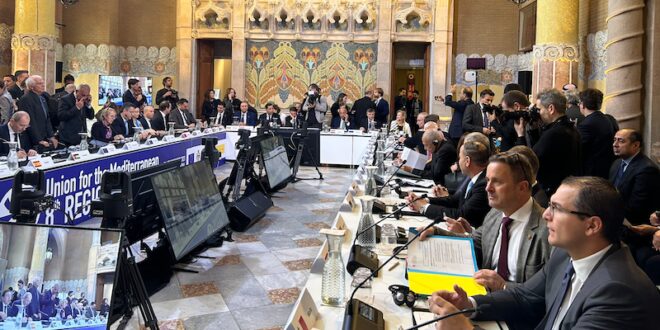Arab states and the EU agreed on Monday (27 November) that a two-state solution should be the answer to the Israel-Palestine conflict, with EU’s chief diplomat Josep Borrell saying the Palestinian Authority should rule Gaza after the war.
Over the past years, the Union for the Mediterranean (UfM), founded 15 years ago in the wake of the Oslo Accords, had largely become a forum for cooperation between the EU and the Arab world.
While Monday’s meeting was initially meant to be of a more celebratory nature, Gaza featured as the single item on the agenda.
Representatives from more than 40 European, Middle Eastern and North African countries met in Barcelona to discuss the Israel-Gaza war and potential peace efforts.
Two-state solution
Speaking after the talks, Borrell said all EU members as well as almost all participants from Middle Eastern and North African countries had agreed on the need for a two-state solution.
A two-state solution envisages a state for the Palestinians in the West Bank and Gaza Strip alongside Israel.
The Palestinian Authority must hold elections and improve its functioning but is the only “viable solution” to the future leadership of Gaza, currently run by Hamas Islamists, to avoid a “power vacuum”, Borrell said.
“Peace between Israel and Palestine has become a strategic imperative for the entire Euro-Mediterranean community and beyond,” he added.
They also came as the four-day fragile pause in hostilities, mediated by Qatar, Egypt and the US to allow the exchange of Israeli hostages for Palestinian prisoners, and the entry of aid into the Gaza strip, entered its final day.
Truce extension
The EU’s chief diplomat said that he had hoped a four-day truce that began on Friday morning would last “a few more days”.
Speaking in Barcelona, Palestinian Foreign Minister Riyad al-Maliki made a plea to extend the fragile ceasefire in Gaza which is hours from expiring.
“We have an opportunity today that will end tonight, to extend the ceasefire (…) I count on the support of my colleagues (…) for us to all leave here with a loud and strong voice that can be heard in all parts of the world: no to the war, yes to the ceasefire,” he said.
Qatar, Egypt, the United States and the EU were working to extend the truce, al-Maliki said, warning if it was not extended, the death toll would double because Gaza’s population is now concentrated in the south of the strip.
“We have to find how to apply the necessary pressure so that the Israeli government does not continue killing innocent people so that we can continue counting cadavers,” he told the forum.
Al-Maliki also said the Palestinian Authority, which lost control of the Gaza Strip in a 2007 power struggle with Hamas, had no need to return to Gaza, adding: “We have been there all the time, we have 60,000 public workers there.”
Jordanian Foreign Minister Ayman Safadi added, however: “Some among us are still refusing to call for a ceasefire (…) We demand it be implemented immediately.”
Safadi said the Palestinian people should decide who rules them, and that any talk of administration of Gaza after the conflict should focus on the West Bank and Gaza as one entity.
Saudi Foreign Minister Prince Faisal bin Farhan Al-Saud said, speaking on behalf of the Organization of Islamic Cooperation (OIC) and the Arab League: “We must endeavour to overcome the current crisis and move towards a credible and serious plan for peace. There is no sustainable alternative to reviving the two-state solution.”
Despite portraying consensus of the talks, Borrell, however, did mention Arab partners who “don’t want to talk about the day after in Gaza without having a clear and credible political prospect. That is why we should agree today to work together to build such a political horizon.”
“Hamas is more than just an organization (…) it is an idea, an ideology. And you cannot kill an idea unless you can prove that you have a better one. To defeat the ideology of Hamas, Palestinians need a credible political prospect for statehood,” Borrell said.
Spanish Foreign Minister José Manuel Albares said he hopes definitive peace talks can be held “as soon as possible so the international community can back the agenda.”
Israel absent
As Euractiv reported earlier, Israel, one of the founding members, did not attend the talks in Barcelona, co-chaired by the EU’s chief diplomat Josep Borrell and Jordanian Foreign Minister Ayman Safadi.
The snub followed a diplomatic dispute with Spain and Belgium after Tel Aviv accused the two countries of supporting terrorism in response to their prime minister’s criticism of its bombardment of Gaza.
Borrell said he “regretted” the absence of Israel and said he hoped the country would be again present in future meetings.
Several diplomats in attendance at the talks stressed that with its decision not to attend, Tel Aviv would have made sure it could dismiss the outcomes of the meeting.
 Eurasia Press & News
Eurasia Press & News




